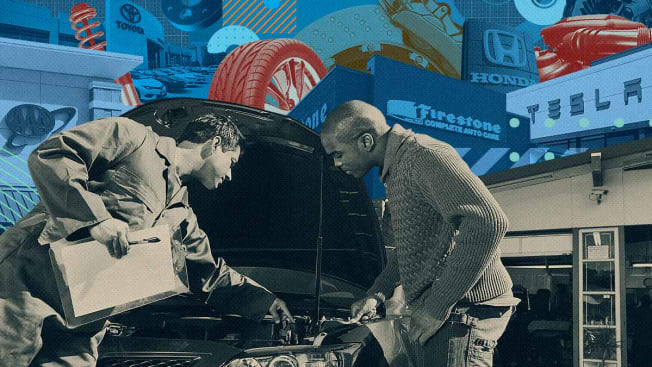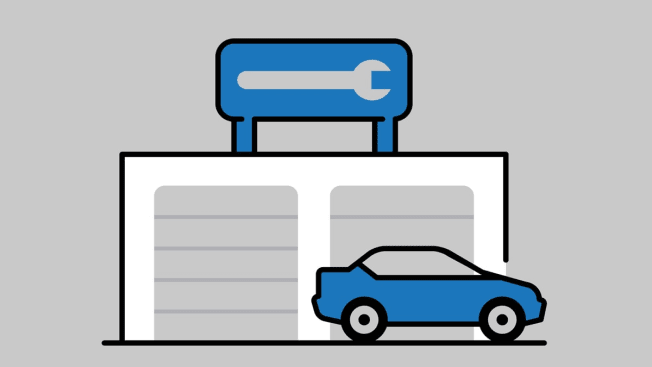Keep Your Car in Great Shape
Advice for where to get your car repaired, and how the right maintenance will save you lots of money

Abbe Herzig recently took her college-age daughter’s 2006 Honda Accord to a local repair shop for its yearly state safety inspection. The car failed the test, and the shop recommended a staggering $3,300 of work to replace worn suspension parts the mechanic said he’d found.
Worried that what they were suggesting was unnecessary, Herzig took the car to another local shop, where it passed inspection quickly. "But I wondered if the second place even looked at the car," she says.
So when she took the car to a third place—a shop where she had a tire replaced on another car—she shared with them the first shop’s expensive estimate. Here the mechanic took her onto the shop floor to show her the parts of the car that needed attention soon to ensure safety. He assured her the car was safe for the time being.
- Where to Go for Repairs : Dealerships Independent Repair Shops Chains
"Simply checking with someone else saved a ton of money," Herzig says. Plus, because the mechanic took the time to show her what was needed and why, she had greater confidence in the necessity of the proposed work. And by getting another opinion, she was able to lower the repair bill on her daughter’s car to just under $2,000.
CR's Car Repair Assistant
Get an estimate for car maintenance and repair work, and have your car fixed right from a network of more than 2,000 shops that guarantee high-quality work at a fair price.
Dealerships
Dealership service departments are usually great for the first few years, when your new car is under warranty. This is especially true if you don’t plan to keep the car much longer than that. A car that’s been dealer-serviced may be more appealing to potential buyers, including the dealership itself. After that, however, the higher labor costs aren’t often worth it.
"Service departments are a profit center for the dealership," says Mike Crossen, a mechanic at CR’s Auto Test Center who is also an ASE-certified master technician with years of experience working in dealership service departments. "They are obligated to handle warranty and recall repairs but also offer other repair services that might be cheaper to have done elsewhere."

Illustration: Elias Stein Illustration: Elias Stein
The dealer will have the factory original parts for your vehicle, as well as technicians trained by the manufacturer to be familiar with repairs specific to the brand. Dealerships are also equipped with expensive factory diagnostic computers. According to CR’s repair shop survey, satisfaction ratings for dealer service departments range from very good (Acura, Lexus, Mazda, and Volvo) to not-so-good (Jeep and Kia). So your experience may depend upon what kind of car you own.
Best For
Fixing infotainment system glitches: "If the screen in the center of your dash has a habit of freezing up, or the touchscreen-activated climate controls aren’t working, the dealership is the most likely place to find someone with the know-how to fix problems that maybe only a factory-authorized technician can access," Ibbotson says.
Price: Varies widely
Safety system recalibration: "Anything from a crack in your windshield to a minor fender dent can upset the calibration of the sensors that make features like automatic emergency braking and adaptive cruise control work," says Ibbotson. The sensors can be located on the thin plastic that covers your bumpers, or inside the windshield. Many independent shops aren’t equipped to recalibrate the sensors so that they can accurately calculate the car’s position in relation to other cars and road hazards. The dealership will most likely have the equipment and experience to do this work correctly.
Price: $300-$600
Software updates: Modern cars are basically rolling computers, with dozens to hundreds of computer modules controlling everything from power windows to engine and transmission operation. "A software malfunction can cause any number of problems—a poorly shifting transmission or exterior lights that don’t illuminate, for example—and may have to be tackled at the dealership, which should have technicians trained on these specific problems," says Ibbotson. Newer cars may be able to receive software updates wirelessly, but older ones will need face time with a technician if there’s an issue.
Price: $150-$200 (more for luxury marques)
Warranty repairs and recalls: When a manufacturer issues a recall for things like faulty airbag components or malfunctioning brakes, the dealership will fix the problem free of charge. Same with malfunctioning cars still under a factory warranty. "An independent shop could possibly fix the problem, but you would have to pay," Ibbotson says.
Price: $0
Not So Great For
Saving money on service and repairs that could be done at a qualified independent shop for less.
Car Owners Favor Independent Repair Shops
Independent Repair Shops
Independent shops can be a great option for someone who wants top-notch service from experienced technicians but also wants to save money on parts and labor compared with what a dealership might charge. According to CR’s repair shop survey, independent repair shops received excellent scores for honesty, quality of work, time to complete the repair, and communication. They also received very good scores for price and getting the problem solved on the first visit.
And while independent repair shops can do most of what a dealer service department can, "some specialize in certain types of vehicles, such as luxury European cars, or even EVs," says Crossen. When your car has a problem, Crossen says, the independent shop you visit regularly should give you an honest appraisal of what’s needed, and refer you to a specialist or dealership if they don’t think they can handle the job.

Illustration: Elias Stein Illustration: Elias Stein
Best For
Basic maintenance: "Simple maintenance like oil changes or fluid level checks that aren’t covered by a new-car warranty don’t need to be done by a factory-trained mechanic," says Ibbotson. "Any experienced tech will do. Performing these procedures are good opportunities for your regular independent technician to check in on your car’s overall health."
Price: $131-$145 (oil change)
Suspension shock/strut: How long shocks and struts last depends on the road surfaces you drive on. Rough roads wear them out more quickly. Worn struts, shocks, and other suspension parts can lead to unsafe braking and handling. Replacing them is usually pretty straightforward and can be handled by any competent mechanic.
Price: $924-$1,043
Major engine repair: Labor-intensive jobs such as a timing belt replacement or a new transmission installation can usually be handled well by an independent repair shop.
Price: $1,915-$2,220 (head gasket replacement)
Water pump: This is an essential part of your car’s cooling system (even in EVs), and will eventually wear out and need replacement. "Independents can replace it when needed," Ibbotson says.
Price: $732-$866
Alternator: In a car with a conventional engine, the alternator converts engine power into electricity to charge the battery and power electronic components. "How easy it is to replace depends on the car’s make and model, but most shops should be able to do it," says Ibbotson. "Hybrid cars have a different type of system, so if the battery isn’t charging, you’ll probably have to go to a dealership or hybrid specialist."
Price: $638-$821
Not So Great For
Recall fixes are best handled by dealerships, which are informed about the needed work directly by automakers.
Chain Repair Shops
Overall, chain repair shops scored near top level in our ratings, and Goodyear Auto Service received top-level scores for overall satisfaction. "Chain repair shops can be a great place to get basic service such as tire installations and wheel alignments at a reasonable price," Ibbotson says. "But generally speaking, independent repair shops are better for most other repairs because they usually have more experienced technicians."

Illustration: Elias Stein Illustration: Elias Stein
Best For
Tires: Tire replacement is sometimes cheaper at a tire repair chain. Be wary, though, of repair recommendations when it comes to other car parts. Also, "don’t feel forced into getting whatever tires the place has on the shelf," says Ryan Pszczolkowski, CR’s tire program manager. "First determine the type of tires you need, then ask the shop to order them. Most will." (See our tire buying guide and ratings.)
Price: $169-$240 (per tire)
Alignment: You should get the wheels aligned when you buy tires (or have suspension parts replaced). Most tire chains have alignment equipment and technicians.
Price: $138-$174
Not So Great For
More complicated repairs that need an experienced technician.
All prices above are based on CR survey data and/or Caliber.com and RepairPal estimates.
Editor’s Note: This article also appeared in the May/June 2024 issue of Consumer Reports magazine.




















